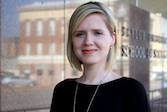Social work is both a highly rewarding and often complex field. Throughout their careers, social workers support a wide spectrum of individuals and populations, which requires a strong skill set and a realistic understanding of the profession.
To offer prospective social workers a real look inside the field including how it benefits clients and where the field is headed, we sat down with Baylor Social Work professor and Associate Dean of Academic Affairs, Melody York Zuniga. Read on as she shares her experiences in social work!
 What courses do you teach at Baylor and how long have you been teaching here?
What courses do you teach at Baylor and how long have you been teaching here?
I began teaching full time for Baylor in 2009, after teaching part-time for a couple of years while also practicing full-time at a local crisis center. My most regular courses have been field internship seminars, MSW capstone, and the foundational theory and practice courses focused on working directly with individual clients, families, and groups.
Did you always want to work/study in the field of social work, or did you have other plans?
As I started college I was pretty sure I wanted to help people directly. As the daughter of a minister and teacher, I assumed international mission work was the path I should pursue. My senior year I discovered social work through an introductory course and a conversation with Diana Garland. I knew immediately that this was the career I had been searching for — a career that would meet people where they are and help them find solutions as they experienced the more challenging moments life can bring. It was at that point that I decided to pursue my MSW.
What area of practice do you specialize in within the field of social work?
My practice experience has focused on supporting individuals, families, and communities who have been hurt by crime. This has included clients who have experienced physical assaults, or lost someone they love to suicide or homicide.
Most of my practice experience, though, has been with those who have survived sexual abuse, as well as the people that love and care for them. This has included children and adults, and I have had the honor of working with those whose most comfortable language for discussing their experiences is Spanish or English. That work has also given me the opportunity to give testimony in both civil and criminal court cases, and get to know some incredibly hard-working people in child protective services, law enforcement, and legal representation.
In a few sentences, how would you answer the question — what do social workers actually do?
Social workers listen to people. Social workers see people as humans with inherent dignity and worth. Social workers see communities as sources of history, strength, and potential. Social workers look at the whole person and the whole picture and work together with those persons to think outside the box and find solutions that meet the clients' goals — not the social worker's goals.
When challenges arise through unexpected or even expected events and/or changes, social workers help people and communities of people adapt to that change or work to address the cause of the challenge.
In your years as a social work professional and educator, how have you witnessed the field of social work change?
I believe more and more people and places are realizing the value of having social workers on their team. Every aspect of life or organized group of people can benefit from social work. Social workers aren't only in hospitals or child welfare systems (though those are extremely important places to have social workers). Social workers have traditionally also been in schools, government, and other helping or service organizations, and we are now finding welcome and important spaces in businesses, libraries, sports organizations, and veterinary clinics.
I am also really pleased to see how the field of social work is learning to adapt to advances in technology. Those in the field are figuring out what this means for social work practice, so it continues to be efficient and effective, while also ethical and safety-oriented for our clients.
Why do you believe social work is an essential profession? In your opinion, how does it add value to the lives of individuals, societies, and the world?
At the heart of any struggle — grief, financial stress, relationship challenges, anything — it matters that people are valued and understood. Social work is a profession built on the belief that all people have value and inherent strength and dignity and is ready to explore multiple pathways to meet a client’s goals and improve their situation. How many spaces in our world right now are people encouraging others to be heard and understood, rather than attacking or belittling those that don't see or experience things the same way?
What do you see for the future of social work?
I am pleased to see that the field is paying attention to the influence of social media and other advances in technology that impact communication, relationships, information, and other aspects of the human experience. The National Association of Social Workers updated the Code of Ethics for 2018, and that update included new and refreshed standards that help us be more mindful of how to utilize and also be careful, clear, and secure when it comes to our own media presence and how we incorporate media and technology in our work.
Is there anything else you’d like to add?
I worried I couldn't do this work because I cry at movies and connect deeply to others' feelings, especially when they are hurting. However, I found that those things are actually strengths of mine — they are some of the things that helped me connect to my clients in ways that communicated "your pain matters" and "of course this is hard" and "I'm in this with you." I didn't fall apart at every heartbreaking story, but rather became motivated to keep helping, and moved with gratitude that people even thought to give me the gift of sharing their story with me.
This is work that matters. This is work you can do.
Start Your Social Work Journey Today
If the thought of a career in social work makes you excited and inspired to make a difference, we invite you to explore one of our many resources. Through these resources, you will learn more about the profession and how an MSW can equip you to expertly serve your future clients. As you consider earning your graduate degree in social work, feel free to reach out to us and request more information or contact us if you have specific questions. We hope to hear from you soon!














